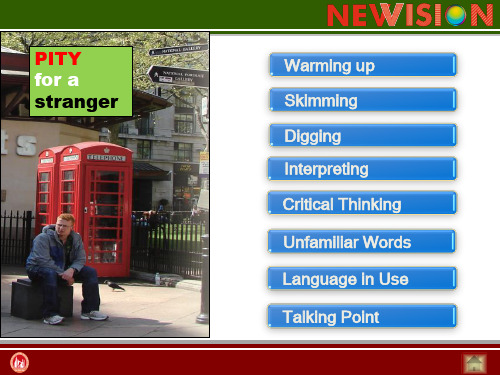新视界大学英语综合教程3第3单元【精品PPT】
- 格式:ppt
- 大小:4.23 MB
- 文档页数:146






新世纪大学英语3综合教程U3TEXTA详解Unit 3HappinessI. Difficult Sentences1. When most people exist near the breadline, material progress does indeed make them happier.(1) What does “exist near the breadline” mean in this passage?(=“Exist near the breadline” means “just have enough money to feed themselves.”)(2) Paraphrase the sentence.(=When a multitude of people in a society only have money enough tofeed themselves, they would feel much happier if they can earn moremoney.)2.But when material discomfort has been banished, extra income becomes much less importantthan our relationships with each other: with family, with friends and in the community.(1) What does “material discomfort has been banished” mean?(=This part means that people have enough money to meet everyday needs, the y don?t worry about their daily life anymore.)(2) Translate the sentence.(=然而,物质上的匮乏一旦消除,收入的增加便不如亲情、友情、邻里和睦等人际关系那么重要。
综合教程3unit3Unit 3: Living in the Digital AgeThe rapid advancement of technology has revolutionized the way we live, communicate, and work. We are now living in the digital age, where the Internet and digital devices have become an integral part of our daily lives. In this unit, we will explore the benefits and challenges of living in the digital age.One of the greatest advantages of living in the digital age is the ease and convenience it offers. With just a few clicks, we can access a wealth of information, communicate with people from all over the world, and complete tasks in a fraction of the time it would have taken in the past. The Internet has made it possible for us to shop online, pay bills, book flights, and even learn new skills without leaving our homes. This convenience has undoubtedly improved our quality of life and saved us valuable time and effort.Another benefit of the digital age is the connectivity it provides. Through social media platforms, we can connect with friends and family who are far away, share experiences, and keep up with the latest news. The Internet has also opened up new opportunities for collaboration and networking. It is now easier than ever to connect with like-minded individuals, join online communities, and participate in global conversations. This connectivity has fostered a sense of global citizenship and unity among people from different parts of the world.Additionally, the digital age has brought about significant advancements in the field of education. Online courses and e-learning platforms have made education accessible to people of all ages and backgrounds. Students no longer need to be physically present in a classroom to learn. They can access educational materials, participate in discussions, and complete assignments from anywhere in the world. This has expanded educational opportunities and democratized learning, allowing more people to gain knowledge and skills.However, living in the digital age also presents its share of challenges. One of the main concerns is the issue of privacy and security. With the amount of personal information we share online, there is an increased risk of identity theft, cyberbullying, and other forms of online harassment. It is crucial for individuals to be vigilant and take necessary precautions to protect their privacy and security in the digital world.Another challenge is the digital divide. While many people have access to the Internet and digital devices, there are still those who are left behind due to various factors such as socioeconomic status or geographical location. This divide prevents equal opportunities for everyone to benefit from the advantages of the digital age. Efforts should be made to bridge this divide and ensure that everyone has access to the digital tools and resources they need. Furthermore, the constant use of digital devices and the Internet has led to a decline in face-to-face interactions and physical activities. People spend more time in front of screens, leading to sedentary lifestyles and health issues such as obesity and eye strain. It is essential to find a balance between the digital world and the real world and to prioritize human connections and physical well-being.In conclusion, living in the digital age has greatly transformed our lives, offering convenience, connectivity, and educational opportunities. However, it also poses challenges such as privacy and security concerns, the digital divide, and the impact on personal interactions and health. It is important for individuals and society as a whole to navigate the digital age responsibly, taking advantage of its benefits while addressing its challenges.。